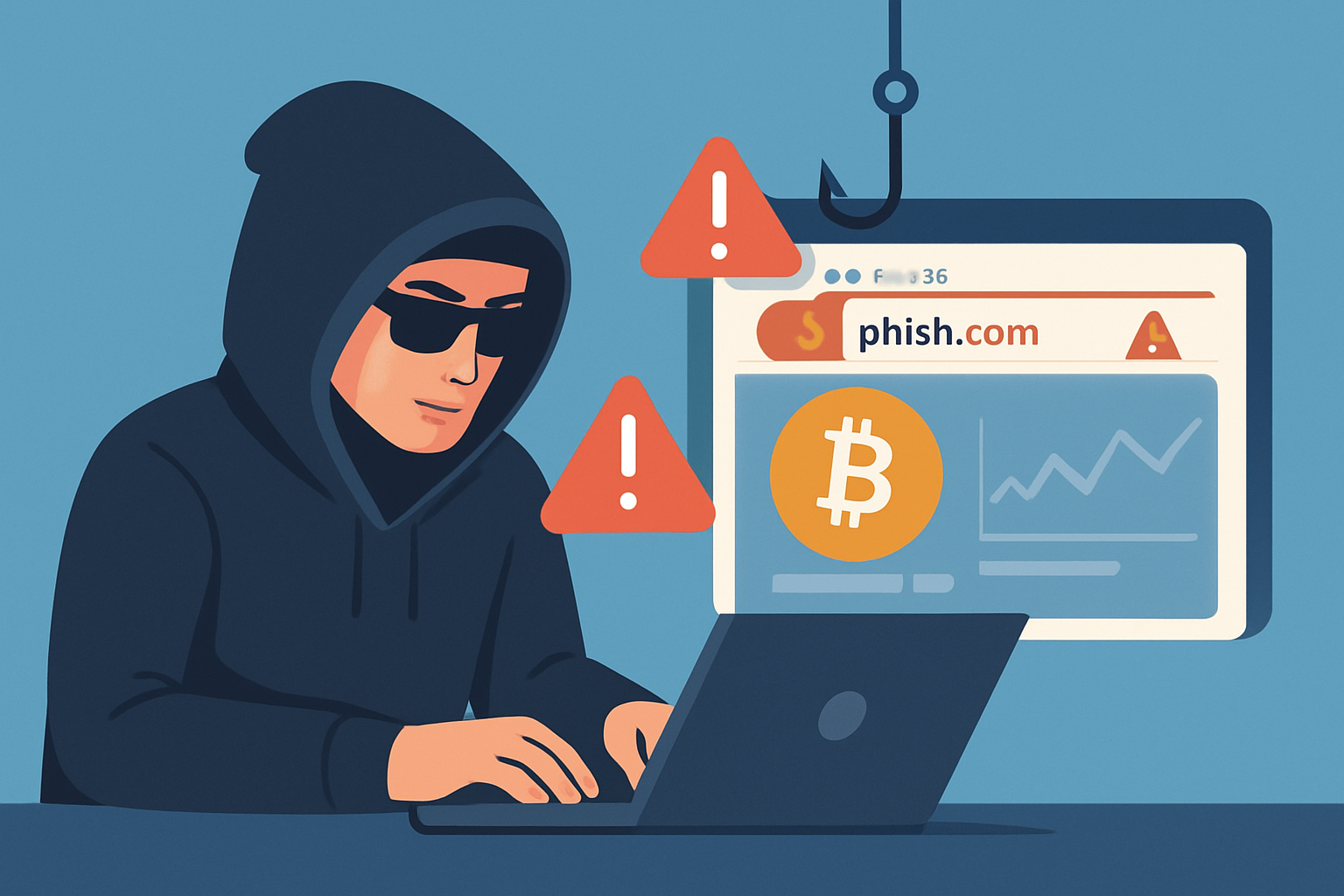Common Crypto Scams To Avoid When Investing


Investing in cryptocurrencies can definitely be tempting, but the space is filled with crypto scams to avoid that target both beginners and seasoned pros alike. This article highlights some of the most common ones to watch for, explains why they happen and the ripple effects they cause.
Why Crypto Scams Seem So Common (and Why They Keep Catching Us Off Guard)
The decentralized nature of cryptocurrency combined with the allure of anonymity often sets the stage where fraud loves to sneak in. A lot of investors find themselves tangled up simply because they don’t fully grasp the technology or get overwhelmed by the endless stream of technical jargon.
Common Crypto Scams to Avoid and Keep an Eye On
Crypto scams come in all shapes and sizes, each with its own sneaky tricks designed to separate you from your hard-earned cash.
Ponzi and pyramid schemes that dangle unrealistic gains like shiny bait, relying heavily on roping in new investors to keep the whole house of cards standing.
Fake ICOs and token sales that ride the wave of excitement around shiny new projects, only to leave hopeful investors holding the bag.
Phishing attacks that lure users to fake websites, tricking them into handing over their login details like unwitting dinner guests.
Pump and dump schemes that cook up artificial price spikes, leaving latecomers stuck with sour grapes.
Impersonation scams banking on fake celebrity endorsements, because who wouldn’t trust a famous face until it’s all smoke and mirrors?
Fake airdrops and giveaways crafted to sweet-talk users into sharing sensitive information they’d probably rather keep under lock and key.
Rug pulls in decentralized finance (DeFi) projects where developers pull a disappearing act with investors’ money, leaving wallets emptier than a fridge on payday.
Malware and keylogger attacks sneaking in to snatch private keys right from users’ devices, like digital pickpockets in the dead of night.
Mistake #1 Falling Headfirst into Ponzi and Pyramid Schemes
Ponzi and pyramid schemes lure investors by promising high guaranteed returns paid not from genuine profits but from the pockets of newcomers. These scams gain traction because urgency and social pressure nudge people to jump on board without a proper second thought.
- Returns that are unrealistically high and always stay steady, almost sounding too good to be true—because well, they usually are.
- Constant nudging to rope in friends and family just to keep the money flowing which can feel pretty uncomfortable if you ask me.
- No clear or verifiable business model behind those promised profits leaving you scratching your head.
- No real products or services supporting the investment making it all feel like smoke and mirrors.
- Frequent delays or annoying hurdles whenever you try to withdraw funds often a red flag about possible liquidity problems.
Mistake #2 Throwing Money Into Fake ICOs and Token Sales (Ouch, been there)
Initial Coin Offerings (ICOs) tend to draw plenty of eager investors looking to jump on promising tokens before the crowd. But as you might guess scammers love to ride that wave of excitement too. They launch projects without reliable teams or real products and vanish once the money rolls in.
- Scarce or sketchy details about the team members and advisors set off alarm bells.
- Whitepapers are either nowhere to be found or do not clearly explain the project's goals.
- Marketing efforts come on too strong promising sky-high returns too quickly and feel like a hard sell.
- No working prototype, product or publicly available code shows honest progress.
- Alleged partnerships cannot be verified and might be smoke and mirrors to boost credibility.
Mistake #3 Falling for Phishing Scams and Fake Websites Like a Rookie
Phishing scams sneakily trick investors into handing over private keys or login details by impersonating trusted websites or sending convincing messages. These attacks tend to work like a charm because scammers mimic reliable platforms so flawlessly that victims often don’t notice a thing until their assets vanish into thin air.
- URLs that look almost like the real deal but sneak in tiny misspellings or add extra characters enough to trip you up if you’re not paying attention.
- Unexpected requests for private keys, seed phrases or 2FA codes are red flags because no respectable platform would ask you to hand those over.
- Emails or messages pretending to be from exchanges try to rush you into verifying your account like it’s an emergency.
- Links popping up in social media, chat groups or forums especially when you haven’t built any trust with the sender are better avoided.
- Phone calls or support offers fishing for sensitive information while disguising their true intentions are classic bait and switch so don’t fall for it.

Mistake #4 Getting Caught Up in Pump and Dump Schemes
Pump and dump schemes operate by artificially pumping up a token's price through coordinated buying sprees to stir a frenzy. This buzz often hooks others in and they ride the wave of excitement, but soon the insiders quietly cash out.
- Sudden bursts of chatter and hype flooding social media, all singing the praises of a certain coin like it’s the next big thing.
- Price spikes that shoot up out of nowhere, without a single news flash or update to justify the climb.
- Groups in private chats or messaging apps suddenly rallying behind coordinated buying moves, almost like a secret handshake.
- The project team going quiet or giving only the occasional sketchy update enough to keep you guessing but not quite enough to feel secure.
- Massive sell-offs right after the coin hits its peak price, sending values tumbling down faster than you’d expect.
Mistake #5 Getting Caught Up in Impersonation Scams and Too-Good-To-Be-True Celebrity Endorsements
Scammers love to prey on the trust people place in celebrities or popular projects by whipping up fake profiles or sneaky deepfake videos that seem like honest-to-goodness endorsements.
- Social media profiles that mimic real celebrity accounts so closely you might do a double take.
- Deepfake audio or video clips that sneakily pass off false endorsements as the real deal.
- Endorsements popping up without any official stamp of approval or coming from unofficial channels.
- Invitations to join hush-hush investment groups promising returns that sound almost too good to be true.
- Offers that seem unusually sweet, often boasting guaranteed profits like it’s a sure bet.
Understanding Why These Mistakes Happen and Just How They Can Throw a Wrench in the Works
Investors often get caught up in scams due to psychological biases and missing pieces in the information puzzle. Overconfidence can sneak in and emotions sometimes drive decisions. Leaning on unverified sources only increases the odds of stumbling repeatedly—mistakes that hit both the wallet and the heart.
- The fear of missing out often nudges investors into rash decisions before they’ve had a chance to think things through.
- Overconfidence can trick people into believing they’re scam detectives when in reality it’s not so clear-cut.
- Skipping deep research leaves cracks that scammers are eager to slip through.
- Leaning too heavily on unverified influencers or the loudest voices in a community can spread misinformation faster than wildfire.
- Social proof and herd mentality tend to herd investors along sometimes without anyone stopping to ask what’s going on behind the curtain.
Practical Tips to Steer Clear of Crypto Scams (Because Nobody Likes Getting Burned)
Building strong defenses against scams involves more than a quick glance. It means carefully verifying every bit of information, staying on top of the latest tricks and sticking to solid security habits.
- Take a good look at project teams, advisors and their track records before you put your money on the line. Doing your homework here pays off.
- Never skip double-checking website URLs and communication channels to make sure they’re real because phishing scams sneak in when you least expect it.
- When storing your private keys, hardware wallets or cold storage are your best friends for keeping hackers at bay.
- Steer clear of any investment that promises guaranteed profits or returns that sound too good to be true. If it’s too shiny it probably is.
- Keep your ears open by monitoring feedback and reputations on trustworthy crypto forums and social media. Often the community’s buzz can save you from a headache or two.
Spotting the Sneaky Early Signs of Crypto Scams
Catching suspicious activity early really is the name of the game when it comes to preventing harm.
| Warning Sign | Associated Scam Types | Potential Consequences | Recommended Immediate Actions |
|---|---|---|---|
| Sudden pressure to invest quickly | Ponzi schemes, Fake ICOs | Making snap decisions here can really hurt your wallet | Take a breath, double-check the facts, and chat with someone you trust before jumping in |
| Requests for private keys | Phishing, Malware attacks | You could end up losing your digital assets in a blink | Keep those keys close to your chest and always confirm who’s on the other end |
| Lack of transparency | Pyramid schemes, Rug pulls | You risk losing your investment or even facing legal headaches | Demand clear paperwork and solid proof before moving forward |
| Unusual account activity | Phishing, Keylogger malware | Funds might be siphoned off without you even noticing | Change your passwords pronto and switch on two-factor authentication — it’s worth it |
| Unexpected solicitations | Impersonation scams, Fake giveaways | Your personal info and money could be in jeopardy | Brush off unsolicited offers and always double-check via official channels |
Avoid rushing headfirst into investments just because everyone else seems to be jumping on the bandwagon.
Never share your private keys or mnemonic phrases no matter how convincing someone sounds or how tempting it might be.
Make sure the info about any project is crystal clear and something you can verify for yourself.
Keep a close watch on your accounts regularly because it’s the best way to catch anything fishy before it causes trouble.
Be wary of unexpected messages and always double-check their authenticity with a healthy dose of skepticism.
Keeping an eye out for these warning signs and making thoughtful choices can really help investors fine-tune their judgment and significantly reduce the risk of getting tangled up in the constantly shifting world of crypto scams to avoid.






